This is the fourth article from the 7-week series on prepping for disabled and elderly. Here is the first article, the second article and the third article.
So far in this series we have discussed the importance of networking, medical bug out bags power needs of durable medical equipment, and prepping for mobility issues. This week we will cover individual prepping for hearing, sight, and speech impairment. It is important to remember that every little detail cannot be covered. This series is here to help you to identify what might make life easier in a grid down or CHTF situation and to create a better quality of life for those that have disabilities or that are disabled. In all instances you should consult your medical professional to ensure that preparedness will not cause harm to you or your loved ones.
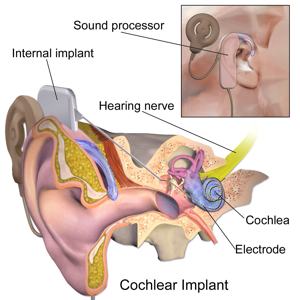 Hearing, sight, and speech bring a set of unique challenges to prepping. With communications being one of the most basic things that we need, it is hard to imagine not being able to communicate. These disabilities add a serious risk to those with the challenges. If you are hearing and/or sight impaired, it is easier for someone to sneak up on you. If you are speech impaired, it makes it difficult for you to explain your needs or an impending emergency. All of these make it more difficult to survive in a CHTF situation.
Hearing, sight, and speech bring a set of unique challenges to prepping. With communications being one of the most basic things that we need, it is hard to imagine not being able to communicate. These disabilities add a serious risk to those with the challenges. If you are hearing and/or sight impaired, it is easier for someone to sneak up on you. If you are speech impaired, it makes it difficult for you to explain your needs or an impending emergency. All of these make it more difficult to survive in a CHTF situation.
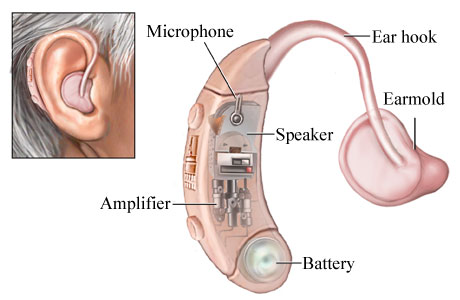 Hearing impairments can be anything from a slight hearing loss all the way through being unable to hear anything at all. Many individuals with hearing impairments use hearing devices such as hearing aids and cochlear implants. It is important to realize that these devices take batteries, and without batteries these devices are essentially useless. One major consideration for those that are hearing impaired is to stockpile spare batteries. You may wonder how many spare batteries you should stockpile. This is up to the individual, but you should realize that these devices are only useful as long as there are batteries to power them. Once the batteries are used up, the device is useless. It is also important to realize that rotating batteries is an important part of prepping for hearing devices. You should use the oldest batteries first, rather than putting them in a box and using whichever ones you grab first.
Hearing impairments can be anything from a slight hearing loss all the way through being unable to hear anything at all. Many individuals with hearing impairments use hearing devices such as hearing aids and cochlear implants. It is important to realize that these devices take batteries, and without batteries these devices are essentially useless. One major consideration for those that are hearing impaired is to stockpile spare batteries. You may wonder how many spare batteries you should stockpile. This is up to the individual, but you should realize that these devices are only useful as long as there are batteries to power them. Once the batteries are used up, the device is useless. It is also important to realize that rotating batteries is an important part of prepping for hearing devices. You should use the oldest batteries first, rather than putting them in a box and using whichever ones you grab first.
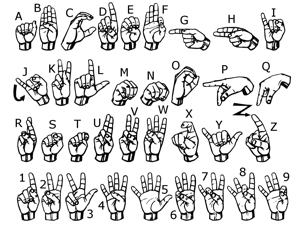 Hearing impaired may need a secondary way of communicating as well. This could include a pad and paper, a white board and erasable markers, or a chalkboard to name a few. Having an ample supply of the materials you need to communicate with hearing impaired individuals is a critical aspect of prepping. You may also consider a laminated card with pictures or common phrases. When talking to someone that is hearing impaired, remember to make sure they are looking at you (and that you are looking at them) when you speak. If they have the ability, they may be able to read your lips or they may be able to combine what they are seeing and partial hearing to better communicate. In some instances, it may be advisable to learn American Sign Language (ASL),
Hearing impaired may need a secondary way of communicating as well. This could include a pad and paper, a white board and erasable markers, or a chalkboard to name a few. Having an ample supply of the materials you need to communicate with hearing impaired individuals is a critical aspect of prepping. You may also consider a laminated card with pictures or common phrases. When talking to someone that is hearing impaired, remember to make sure they are looking at you (and that you are looking at them) when you speak. If they have the ability, they may be able to read your lips or they may be able to combine what they are seeing and partial hearing to better communicate. In some instances, it may be advisable to learn American Sign Language (ASL), 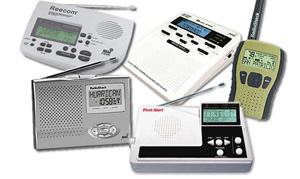 if you have not already done so, as a method to increase communications between you and your loved one with a hearing impairment. It might also be advisable to purchase hearing impaired equipment for warnings, such as a NOAA hearing impaired weather radio. This could assist the hearing impaired individual to know when danger is approaching. In a grid down situation, it is likely this that a NOAA alert system will be inoperable.
if you have not already done so, as a method to increase communications between you and your loved one with a hearing impairment. It might also be advisable to purchase hearing impaired equipment for warnings, such as a NOAA hearing impaired weather radio. This could assist the hearing impaired individual to know when danger is approaching. In a grid down situation, it is likely this that a NOAA alert system will be inoperable.
Related: 7 Actions to Take Immediately Following an EMP Strike
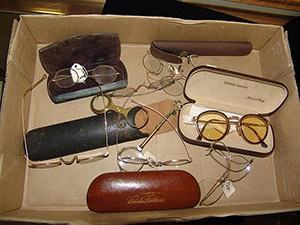 Sight, or lack thereof, is another sense that can add stress in a CHTF situation. Sight issues can be as simple as being near sighted or far sighted, or they could include deteriorating eyesight (such as macular degeneration) or total blindness. When considering these individuals in a prepper situation, it is important to stockpile whatever assistive devices they use. Eyeglasses are the most common assistive device required, and having several pairs of eyeglasses would be advisable. Purchasing a second and third pair of eyeglasses is just plain common sense. While not the best solution, when a change of prescription occurs, the older prescription could be kept as a backup pair of glasses. While they would not provide the clarity that the new glasses would provide, they would at least make the world a little clearer.
Sight, or lack thereof, is another sense that can add stress in a CHTF situation. Sight issues can be as simple as being near sighted or far sighted, or they could include deteriorating eyesight (such as macular degeneration) or total blindness. When considering these individuals in a prepper situation, it is important to stockpile whatever assistive devices they use. Eyeglasses are the most common assistive device required, and having several pairs of eyeglasses would be advisable. Purchasing a second and third pair of eyeglasses is just plain common sense. While not the best solution, when a change of prescription occurs, the older prescription could be kept as a backup pair of glasses. While they would not provide the clarity that the new glasses would provide, they would at least make the world a little clearer.
For the sight impaired, it is important that there are two lists of the supplies that might be needed in a CHTF situation. The first might need to be in braille if the individual is completely blind, the second should be in writing. By having both lists, the sight impaired individual and their family member or caretaker can work together to ensure that all of the items needed in a bugout situation are included. As with any preparing, it is important to test this plan on a regular basis.
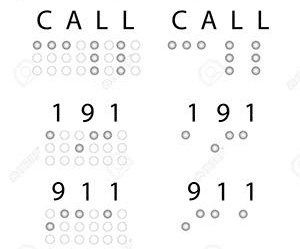 A common low-tech communications method that might assist the prepper and the person with a disability is a braille/text communication card. These cards allow two-way communication, and can be extremely important in a grid down situation. It provides a basic method of two-way communication, especially if the individual has more than one communication disability. For those that use a white cane, it is also advisable to have more than one cane to allow the person to get around should the first one get broken. If the sight impaired person will be moving to a different location during a CHTF or grid down situation, you might consider bringing them to that location in advance and give them the opportunity to familiarize themselves with the layout. This will reduce the initial stress should it be needed later.
A common low-tech communications method that might assist the prepper and the person with a disability is a braille/text communication card. These cards allow two-way communication, and can be extremely important in a grid down situation. It provides a basic method of two-way communication, especially if the individual has more than one communication disability. For those that use a white cane, it is also advisable to have more than one cane to allow the person to get around should the first one get broken. If the sight impaired person will be moving to a different location during a CHTF or grid down situation, you might consider bringing them to that location in advance and give them the opportunity to familiarize themselves with the layout. This will reduce the initial stress should it be needed later.
 Speech impairments can also be stressful in a grid down or CHTF situation. Much like the hearing impaired individual, another method of communication should be considered. This could include a pad and paper, a white board and erasable markers, or a chalkboard. You should also make sure you have an ample supply of the materials needed to communicate with speech impaired. As with the hearing impaired, you may also consider a laminated card with pictures or common phrases. If an augmented communication device is used (such as a voice box), you might consider trying to purchase a second unit and additional batteries. The life on these devices are not indefinite, so plan for the worst and hope for the best.
Speech impairments can also be stressful in a grid down or CHTF situation. Much like the hearing impaired individual, another method of communication should be considered. This could include a pad and paper, a white board and erasable markers, or a chalkboard. You should also make sure you have an ample supply of the materials needed to communicate with speech impaired. As with the hearing impaired, you may also consider a laminated card with pictures or common phrases. If an augmented communication device is used (such as a voice box), you might consider trying to purchase a second unit and additional batteries. The life on these devices are not indefinite, so plan for the worst and hope for the best.
In closing, it cannot be stressed enough that when prepping for elderly and disabled individuals, it is extremely important to test and adjust your plans to cover any identified problems. By testing your plans, you will see where there is not enough preparedness or where problems may arise as well as what does work as expected. When you do find a flaw in your plan, you have the opportunity to mitigate those problems while supplies are still readily available.
Also from this series:
Prepping to Power Medical Equipment When SHTF
Prepping for Disabled and Elderly Populations
Prepping for People with Mobility Issues
You may also like:
10 Things to Have Ready before the Huge EMP !!!
H2O Dynamo – The Awesome Device That Turns Air Into Fresh Water! (Video)
About the Author: Russ Fuller is not this contributor/authors real name. The author is an avid prepper who is well-known in the public safety field. He uses a pen name to protect his identity due to the stigma that surrounds prepping and survival from those that are not preppers. He feels this stigma could damage his reputation, credibility, and his employment in public safety. In his job, he helps disabled and elderly individuals prepare for short-term disasters and is considered a subject matter expert in the field.
Disclaimer: The information contained in this series is for informational purposes only. A medical professional should be consulted before taking any actions. It should also be noted that due to the varying levels of knowledge among preppers, this series will explain the most basic actions that can be taken through advanced levels of preparedness.

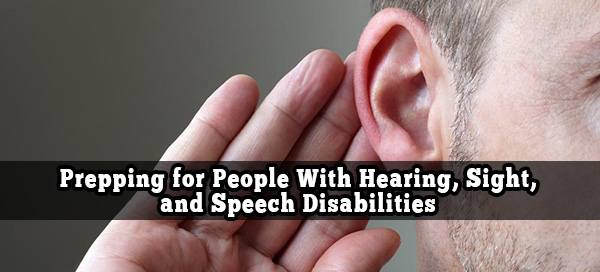














When are the remaining three articles due to come out. I have been awaiting them, as this type of information is important to me and others in my family. Please finish the series. Thanks
I think this info appeared before I was following this list. I am hearing impaired. I have found that the old fashioned cupping the hand behind the ear will aid in hearing. It won’t replace a hearing aid but it certainly significantly improves my hearing ability. It looks a little old fashioned but it works for me. It may not work for you as hearing impairment is different for different people.
A pre-printed card with common phrases on it is an excellent idea in a tight situation. Might have one printed in letters large enough to be read at a distance in case folks are in positions where they can’t freely move and want to communicate. Remember, if the hearing loss is in a mature individual, they probably have vision impairment also.